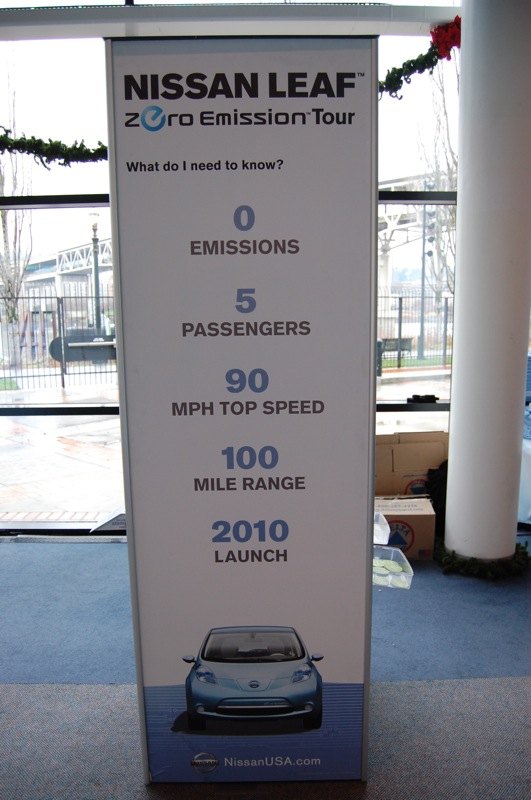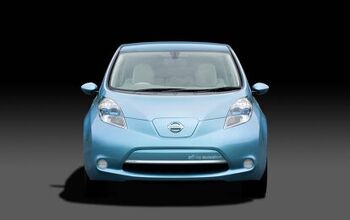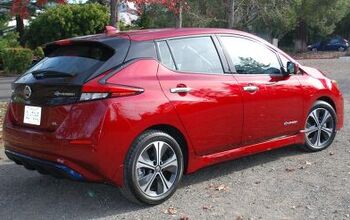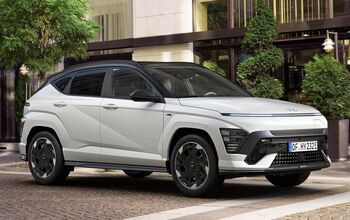How Much Will The Nissan Leaf Cost Anyway?
Nissan has had a $25k target pricetag on its forthcoming Leaf EV for some time now, as it’s built hype towards the car’s commercial rollout later this year. That price will be crucial in taking on GM’s Volt EREV, which is said to retail somewhere in the $40k ballpark but offers a range-extending gas engine. Allcarselectric.com got a little more detail out of Nissan execs, and reported back in November that
According to Brian Carolin, Nissan’s marketing executive for North America, the cost of the upcoming Leaf will be equivalent to the monthly cost of a fully loaded Honda Civic, plus the cost of its monthly fuel bill. To simplify pricing Carolin broke it down as such, “That means the purchase price (about $28,000) or comparable monthly payment for a high-end Civic plus the cost of the gasoline it would need to cover 1,200 miles (at 30 MPG and $3/gallon, about $120.”
Well maybe the words of Carolin are not easy to decipher. It appears as though he is trying to say that a Nissan Leaf will run about $120 more per month in payments if the vehicle is financed.
For example, if a fully loaded Honda Civic can be leased for $319 per month. Adding in a monthly fuel cost of $120 brings the total monthly out of pocket expense to $439. Nissan will either sell or lease the Leaf and its battery at that same price.
If that isn’t confusing enough, consider this: Nissan has just announced [via MarketWatch] that the Japanese-market Leaf will cost between 3.5m and 4m Yen ($38,661-$44,184). Of course, the US launch will coincide with US production at Nissan’s Smyrna facility, and that extra volume could help keep the price down. But will it really be $10k-$20k less than what the Japanese are being asked to pay? You’ll have to forgive us for being skeptical about that. Meanwhile, Nissan claims that 50k people have registered for ordering priority already (pre-orders begin in April), but they’re likely banking on a $25k price point. When real pricing comes out, it will be interesting to see how many of those folks actually sign up to buy the first mass-market EV on the American market.
More by Edward Niedermeyer
Latest Car Reviews
Read moreLatest Product Reviews
Read moreRecent Comments
- Rna65689660 For such a flat surface, why not get smoke tint, Rtint or Rvynil. Starts at $8. I used to use a company called Lamin-x, but I think they are gone. Has held up great.
- Cprescott A cheaper golf cart will not make me more inclined to screw up my life. I can go 500 plus miles on a tank of gas with my 2016 ICE car that is paid off. I get two weeks out of a tank that takes from start to finish less than 10 minutes to refill. At no point with golf cart technology as we know it can they match what my ICE vehicle can do. Hell no. Absolutely never.
- Cprescott People do silly things to their cars.
- Jeff This is a step in the right direction with the Murano gaining a 9 speed automatic. Nissan could go a little further and offer a compact pickup and offer hybrids. VoGhost--Nissan has laid out a new plan to electrify 16 of the 30 vehicles it produces by 2026, with the rest using internal combustion instead. For those of us in North America, the company says it plans to release seven new vehicles in the US and Canada, although it’s not clear how many of those will be some type of EV.Nissan says the US is getting “e-POWER and plug-in hybrid models” — each of those uses a mix of electricity and fuel for power. At the moment, the only all-electric EVs Nissan is producing are the Ariya SUV and the perhaps endangered (or maybe not) Leaf.In 2021, Nissan said it would make 23 electrified vehicles by 2030, and that 15 of those would be fully electric, rather than some form of hybrid vehicle. It’s hard to say if any of this is a step forward from that plan, because yes, 16 is bigger than 15, but Nissan doesn’t explicitly say how many of those 16 are all-battery, or indeed if any of them are. https://www.theverge.com/2024/3/25/24111963/nissan-ev-plan-2026-solid-state-batteries
- Jkross22 Sure, but it depends on the price. All EVs cost too much and I'm talking about all costs. Depreciation, lack of public/available/reliable charging, concerns about repairability (H/K). Look at the battering the Mercedes and Ford EV's are taking on depreciation. As another site mentioned in the last few days, cars aren't supposed to depreciate by 40-50% in a year or 2.


































Comments
Join the conversation
I have lived in a large urban environment for quite a while (recently moved out). I still have friends there that absolutely LOVE the idea of an electric city car since they sit in traffic so much. The problem is they have no place to plug this thing in -- they all park on the street. With an ICE car you only fear vandalism theft. With an electric card you'd have to rent a garage spot and get permission to use the electrical outlets. Common pricing is $100-$150/mo. Doesn't that eat up the advantages of not having to buy gasoline? Also: we have (in higher end/more expensive places) deeded parking spots. Is saving a few $ on gas worth shelling out $50-75k for a deeded parking spot? This spot may not even have an electrical outlet either....it just buys you parking! On top of this, it is not uncommon to have a week + with the temperature mostly below 0F (-17C). How do these batteries hold up at those temperatures? What happens when these people switch jobs & reverse commute on the highway to the suburbs for 1-2 hours & leave tons of accessories running (heater in the winter, music, lights, etc)? How does the TOTAL cost compare to: 1) public transport (Your car travelling in the same traffic as a bus isn't necessarily going to get you to your destination faster, and it will be slower than taking the train at rush hour) 2) A conventional ICE car I think there are still a lot of problems to be solved w/ electric cars, even for the "heavily urban" target market.
I'm certainly interested in an electric commuter; I'm afraid I'm going to have to replace my old Civic eventually. (By 'replace' I mean that my son will be driving in a few years and I'd rather let him use my 20 year old beater than anything nicer, which will leave me needing a way to get around). Even $28K is a bit more than I'd want to spend; I don't drive that many miles so I may have to wait for the technology to be refined and hope the price comes down sometime later. As for gas prices; all it takes is a couple of good GOM tropical storms to send us back to $4/gallon. It hasn't been THAT long since the gas lines in the South after Ike (less than 2 years) and the massive price spikes after Katrina/Rita (less than 5 years). Odds are good something will disrupt supply again soon and we'll be skirting $4/5 gas for a while before things get sorted out.